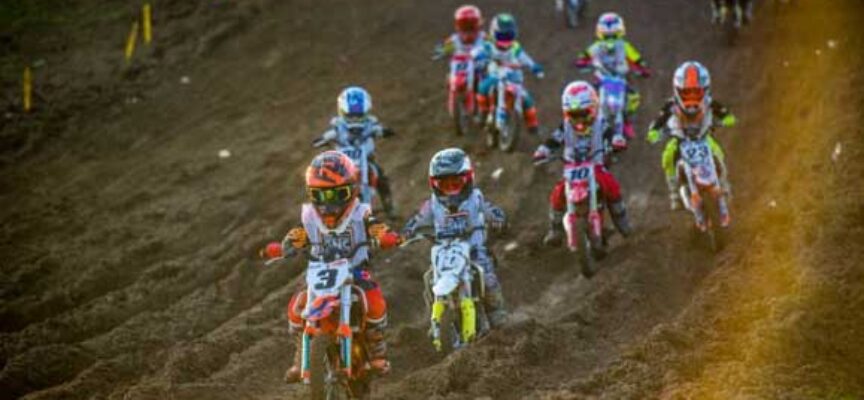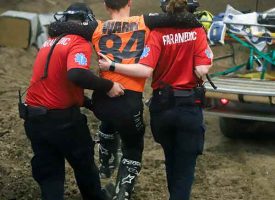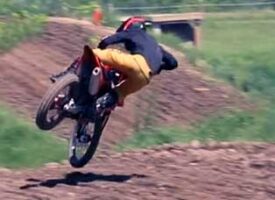Globe and Mail | Tykes on dirt bikes: Motocross sees an unlikely youth boom during the COVID-19 pandemic
Young riders are the future of motocross and, this year at the Walton TransCan, there were more of these little rippers in the 50 cc dirt-bike class than there have been in seven or eight years
By: MATT BUBBERS
SPECIAL TO THE GLOBE AND MAIL
PUBLISHED AUGUST 25, 2021
/cloudfront-us-east-1.images.arcpublishing.com/tgam/G5QVEVKS4NBL3NPNELA4L7BPPE.jpg)
Dressed in snazzy neon pants, plastic boots, goggles and too-large helmets that make them look an awful lot like bobblehead figurines, a group of roughly 30 young motocross racers – some of whom are still in kindergarten – rev tiny engines at the starting gate of the 2021 Walton TransCan, the biggest race of their short careers. If this group of four- to six-year-olds showed up at your doorstep on Halloween wearing their racing regalia, you might guess they were superheroes, but they are, in fact, a sign of motorcycling’s bright future.
Under blue skies on a Saturday in August, the racers sit patiently astride their miniature motorcycles at Walton Raceway, home of the TransCan Grand National Championship, the most important event in the Canadian amateur motocross season. It’s a four-day affair that draws families from Alberta, British Columbia, Quebec and the Maritimes, as well as all over Ontario.
While parents snap photos and give last-minute pep-talks, many of the young boys and girls look ahead toward the first corner and wait for the starting gate to drop. When it does, they take off with surprising speed and a sound like a swarm of mosquitoes buzzing into the distance. They bounce around the dirt track, catch a little air over jumps, and generally create the sort of formative experiences that can lead to a lifelong obsession with motorcycles, or so the industry hopes.
/cloudfront-us-east-1.images.arcpublishing.com/tgam/TFW7NME4EFCOHHENSX5BH3AI7Y.jpg)
Young riders are the future of motocross and, this year at the TransCan, there were more of these little rippers in the 50 cc dirt-bike class – and more young riders in general – than there have been in seven or eight years, says Melody Hodgson, co-owner of Walton Raceway. For her and her family, the track — on their 200-acre farm in Walton, Ont. — is home. You’ll find it northwest of Kitchener, in farm country not far from Lake Huron, and you’ll know you’re in the right place because the sign for Walton bills the hamlet as “Motocross Town.”
In total, there were over 830 entries this year across all classes – from four-year-olds to retirees – which was the second-highest number in the event’s 29-year history, Hodgson says. “It’s beyond phenomenal,” she adds. She’s not alone. Organizers of other races, from house-league events to the Ontario provincial amateur series, say they’ve seen participation in motocross roughly double since the start of the pandemic.
“It’s COVID, honestly,” Hodgson says. “There were great downsides to the pandemic, obviously, but as far as this industry goes, motocross, we’re benefiting from it hugely,” she says as another group of riders takes off from the starting gate. With no team sports, no in-person school and no going over to friends’ houses for much of the past year and a half, more parents and children turned to the dirt.
/cloudfront-us-east-1.images.arcpublishing.com/tgam/GCCTFSYZYZFKPC56RXWRYL7T6Q.jpg)
That’s good news, not just for Hodgson and Walton Raceway, but also for the future of motocross, and perhaps even for the motorcycle industry in general. Most of these young riders won’t go on to become professional racers, but some will surely go on to compete on weekends, ride forest trails or maybe even buy a Harley-Davidson.
Tom McMullin from Nottawa, Ont., a few minutes south of Collingwood, is at the TransCan with his five-year-old son, James, who’s racing in the Tyke class for the newest riders; some of their bikes still have training wheels but they line up just like the pros and twist the throttle when the flag drops. (It’s cute. But no young racer wants to hear that before a big race.)
McMullin bought his son his first motorcycle during the pandemic. “He wakes up and he’s already got his jersey on and he’s like, ‘When can I go ride?’” McMullin says. “It’s been the only thing in the last year that [James] has actually gravitated to,” he adds.
Motocross is not an inexpensive sport to get a child hooked on, though; the second-hand Yamaha PW50 McMullin bought for his son cost $1,200. Protective gear costs at least another few hundred bucks. New 50 cc-class bikes cost anywhere from $1,800 to more than $6,000 for a state-of-the-art electric KTM or Husqvarna.
/cloudfront-us-east-1.images.arcpublishing.com/tgam/372K46MBINBAXO3D6MXPDNBNBU.jpg)
It’s not cheap, but since riding takes place on closed courses in wide-open outdoor spaces and requires protective equipment – in the form of helmets, goggles and gloves – motocross is a strangely perfect sport to do during a pandemic. This fact might not have been on the minds of the earliest participants as they scrambled through muddy fields on crude motorcycles in the 1920s, but it has nevertheless helped to sell a lot of motorcycles recently.
Along with other outdoor recreational vehicles like bicycles and jet-skis, sales of off-road motorcycles of the sort you see at the TransCan skyrocketed last year. So far in 2021, sales are down slightly from last year’s record highs, but experts and industry insiders suggested the drop has more to do with supply shortages and shipping issues than a lack of demand. For its part, Walton Raceway ordered 15 dirt bikes for their learn-to-ride program, but only about half were delivered and they arrived late.
Finding a place to ride is a bigger issue for Amanda Keller’s four-year-old son Ryder Jamieson, who got his first bike during the pandemic. They live in a townhouse in Alliston, Ont., about 40 minutes southwest of Barrie. At the TransCan, Jamieson can let the 50 cc engine sing, but at home, the neighbours complained when he would ride behind their houses.
That’s the biggest challenge for the sport, admits Jean-Sebastien Roy. “It’s hard to find places to ride,” without infuriating the neighbours, he says. JSR, as motocross fans call him, has been around dirt bikes since the 1980s, first as a racer, winning the TransCan in the nineties and early-2000s, and now as racing team manager for KTM, a major European motorcycle brand.
He understands that some parents might balk at the idea of letting their child or teenager ride a motorcycle. There are risks involved, but he thinks five years old is the perfect time to start riding. “They don’t get hurt,” he says. “They learn how to crash and get back up. They learn how to battle with each other at running speed.”
/cloudfront-us-east-1.images.arcpublishing.com/tgam/63JTOXH7Z5DDHI7T5CTSHC73BQ.jpg)
Despite the risks and the costs, JSR says participation in motocross had been growing, albeit slowly, since about 2011 – until the pandemic gave the sport a huge boost. That was made possible in part by Ryan Gauld, president of Amateur Motocross Ontario, one of the sport’s sanctioning bodies. Gauld lobbied townships and the provincial government to ensure events could take place with appropriate safety measures.
It’s not just young riders getting into motocross now; Brett Lee – Melody Hodgson’s husband and the other co-owner of Walton Raceway – recently started riding again after a 15-year hiatus. “I cleared one of the big jumps here and you feel a bit, like, alive,” Lee says, still enthusiastic even after four long days running the TransCan.
Whether or not the pandemic-fuelled motocross boom turns out to be a blip, one thing is for certain: Once you ride a motorcycle, it tends to be something you want to do again and again, and possibly for the rest of your life.
For the motorcycle industry, the boom is welcome, even though road-legal bikes still make up the majority of sales. For Brett Lee, Melody Hodgson and their family farm, however, the boom means everything.
In the years leading up to the pandemic, they struggled to build the TransCan into what it is now. “We just didn’t have the money,” Hodgson remembers. In 2018, they were happy just to break even on the event. “You’re trying to pay the mortgage on the farm, you’re trying to make sure you’re servicing all your debt, paying back bills, and there was just nothing extra.” Now, she says, the future looks bright.
After the last race of the 2021 TransCan, Hodgson and Lee hand out trophies on stage as the sun sets. The names of the riders in the Tyke class are called out – including James McMullin and Ryder Jamieson – and they all walk onto the podium to collect their plaques for what could be the first of many times.







No comments!
There are no comments yet, but you can be first to comment this article.